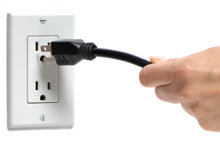When changing rooms while running the vacuum cleaner, I quickly change wall sockets, walk over to the vacuum, turn on the switch, and the vacuum won't run. I go through all sorts of gyrations to try to figure out what is wrong. I flip the on/off switch rapidly several times. I use good ol' Texas engineering when anything mechanical doesn't work - I bang on it several times! I check the agitator to make sure it's not clogged or hung. Then I punch all the adjustment buttons for good measure.
About this time, Donna enters the room, notices the plug is loose in the wall socket, plugs it in more securely, and the infernal machine roars to life scaring me to death. Somehow, the vacuum's plug came loose in the wall socket. No power, no vacuum! Duh!!
What seems so obvious sometimes gets forgotten in the middle of life's madness. This is never more true than in the release of the Holy Spirit's power into the life of Jesus' church. We craft mission statements, we focus on good church communication, we rally the troops, we print up banners, and we do everything in our power to pull off a new project trying to give our church some momentum. All of these can be extremely important; unfortunately, we often forget the most important part of the process: seeking the Spirit's power to be released into the life of God's people to accomplish the Lord's work in our world.
Jesus' LifeWORDS this week focus on the necessary release of God's power if God's mission is going to be accomplished:
"I am going to send you what my Father has promised; but stay in the city until you have been clothed with power from on high" (Luke 24:49 TNIV).
Now clearly, some churches have been waiting to do something for many years, yet end up doing nothing. Therefore, we must notice that Jesus' command to wait - "stay in the city" - is a limited duration command. We know from other references that his followers devoted themselves to waiting in prayer with the expectation of the Lord sending the Spirit to empower them (Acts 1:12-14). They followed Jesus' command, and the Lord was faithful to do what he promised (Acts 2:1-4)! Then, the Lord intervened with power again, when they sought His help in facing a time of trial (Acts 4:1-31). In fact, the book of Acts is a repetition of this process repeatedly.
We see a similar commitment by the apostle in the life of the church in Ephesus. Few people in Paul's time were as fascinated by spiritual power as the people of Ephesus (Acts 19:1-20). Paul wrote to help them face the challenges of their culture.
- He prayed that they would be given the Spirit of knowledge to know Him better (Ephesians 1:15-17).
- He also prayed that they would experience the power that raised Jesus from the dead in their lives (Ephesians 1:18-22).
- He later prayed that God would strengthen them by the Spirit in their inner being (Ephesians 3:16).
- He talked about worship and submission in terms of being filled with the Spirit, instead of being enthused on wine (Ephesians 5:15-21).
- He later challenged them to let the Spirit use God's word in their lives and encouraged them to "pray in the Spirit" (Ephesians 6:17-19).
Paul is not trying to give us a cookbook formula for being filled with the Spirit, but he is demonstrating the importance of seeking God in prayer. He is showing us that prayer, worship, submission, and the word of God are crucial in releasing the Spirit's power in our lives.
I don't know about you, but this quick overview of the work of the Spirit in the early church is both encouraging and convicting. It is convicting because we so often leave out the spiritual disciplines and the power of the Holy Spirit from our plans. It is encouraging because it reminds us of God's great power for those of us who believe.
The following questions are for your personal reflection, for sharing in a small group of friends, or for use in a home gathering. I'd also love to hear from you on my blog and see what you think about this message and these questions:
http://www.heartlight.org/thephilfiles/2009/08/13/wait/
Why do you think it is so hard for us to "wait" on the Lord in prayer, worship, and seeking His guidance?
What is the difference in praying and praying with expectation that God is going to do something only He can do?
Paul uses the phrase "I eagerly expect and hope" to talk about God's work in life and death to bring Him glory and bring Paul deliverance (Philippians 1:19-25).
What difference does it make to approach God's promises with expectation and hope?
Paul expects God to act with power through his prayers for the Ephesians (see the Scriptures mentioned above) can we expect God to do the same for the people in our church?
Of course, Paul challenges the Ephesians to expect God to work and to submit their lives to God. How can we do this in our spiritual family?
Read through the story of Jesus feeding the 5,000 again, and share some principles from this story that fit the theme of prayer and the release of God's power (Luke 9:10-17).












Comments
Have thoughts on this article? Leave a comment